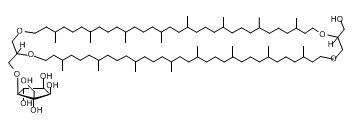Category:LBGA
Archaeal Lipid
Class Overview
Archaeal lipid is composed of sn-glycerol 1-phosphate and ether-linked isoprenoids (C20 phytanes). This composition is different from lipids in eubacteria and eukaryotes, which comprise of sn-glycerol 3-phosphate and ester-linked fatty acids. Responsible biosynthetic enzymes are also non-homologous. Archaea also contains tetraether lipids in which two isoprenes (C40 biphytanes) are ether-linked with two glycerols at both ends (caldarchaeol). |
アーキア[1]の脂質は、 sn-グリセロール1リン酸にメバロン酸由来のイソプレン骨格(C20フィタン)がエーテル結合しています (snがわからない人は異性体のページを参照してください)。 これは、グリセロール3リン酸と脂肪酸を利用する真正細菌や真核生物と全く異なる構造で、生合成をおこなう酵素も相同ではありません。またテトラエーテル型と呼ばれる、長さ40のバイフィタンが末端で2分子のグリセロールとエーテル結合した環状脂質(カルドアーキオール)も広く存在します。 |
- ↑ 古細菌と呼ばれることが多いのですが、真正細菌と明確に区別するためにここではアーキアと記します。
Phylogeny
Archaea are separated into two major phyla (Crenarchaeota and Euryarchaeota)[1] and three ecologically different microbes exist: thermophile, halophile, and methanogen (Table 1). Previously archaea were believed to exist only in extreme environments, but their habitat is actually ubiquitous from sea surface to deep underground. Genus names are summarized here. |
アーキアは大きくCrenarchaeotaとEuryarchaetaという二大グループに分かれ[2]、 アンモニア酸化菌、好熱菌、好塩菌、メタン生成菌の4種類が含まれます(表1)。以前は極限環境に住むと考えられていましたが、特にアンモニア酸化菌 (thaumarchaeota) は海から地底まで遍在することがわかっています。属名一覧は別ページにまとめています。 |
| Phyrum (綱) | Order (目) | Family (科) | Character | Gram-staining |
|---|---|---|---|---|
| thaumarchaeota | cenarchaeales | cenarchaeaceae | ammonia oxidizer | ? (unculturable) |
| crenarchaeota | desulfurococcales | desulfurococcaceae, pyrodictiaceae | Non-methanogenic (hyper) thermophils |
negative |
| sulfolobales | sulfolobaceae | |||
| thermoproteales | thermoproteaceae | |||
| euryarchaeota | thermococcales | thermococcaceae | ||
| thermoplasmatales | thermoplasmataceae | |||
| halobacteriales | halobacteriaceae | Halophils | negative | |
| methanobacteriales | methanobacteriaceae, methanothermaceae | Methanogens | mostly positive | |
| methanococcales | methanococcaceae, methanocaldococcaceae | |||
| methanomicrobiales | methanomicrobiaceae, methanospirillaceae | |||
| methanopyrales | methanopyraceae | |||
| methanosarcinales | methanosarcinaceae, methanosaetaceae |
- ↑ Studies on mostly uncultured archaea identified other small phyla such as Korarchaeota (Barns et al. 1996 PMID 8799176), Nanoarchaeota (Huber et al. 2002 PMID 11986665), and the Thaumarchaeota (Brochier-Armanet et al. 2002 PMID 18274537). They are characterized only by genome sequences and not considered here.
- ↑ 難培養性のアーキアとしてKorarchaeota (Barns et al. 1996 PMID 8799176), Nanoarchaeota (Huber et al. 2002 PMID 11986665), Thaumarchaeota (Brochier-Armanet et al. 2002 PMID 18274537)などの小グループも見つかっていますが難培養性でゲノム解析のみのため、生物分類上は確定していません。
Nomenclature
Much of archaeal lipid were named by a Japanese research group[1]. Note that sn-1 position of glycerol is at the bottom of the pictures and the ether bond at the sn-2 position is below the paper plane. |
アーキア脂質の名称の多くは日本人によって名付けられました。以下の図ではグリセロールの sn-1 位が 下側で-OH として表示されています。sn-2 位の水酸基は紙面の奥側です。通常のグリセロ脂質の描き方とは向きが異なるので注意してください。 |
Archaeol (= 2,3-di-O-alkyl sn-glycerol diether)  C20/20, C25/20, C25/25 |
| ||
|---|---|---|---|
Caldarchaeol 
|
| ||
Calditocaldarchaeol 
|
| ||
(Macro)Cyclic Archaeol 
|
|
- ↑ Nishihara M, Morii H, Koga Y (1987) Structure determination of a quartet of novel tetraether lipids from Methanobacterium thermoautotrophicum. J Biochem 101:1007-1015 PMID 3611039
- ↑ Few species contain C25/25 or C20/25 isopranoids.
- ↑ Bleriot Y, Untersteller E, Fritz B, Sinay P (2002) Total Synthesis of calditol: Structural clarification of this typical component of archaea order Sulfolobales. Chemistry 8(1):240-246 PMID 11822455
- ↑ Sprott GD, Meloche M, Richards JC (1991) Proportions of diether, macrocyclic diether, and tetraether lipids in Methanococcus jannaschii grown at different temperatures. J Bacteriol 173, 3907-3910 PMID 2050642
- ↑ Kaneshiro SM, Clark DS (1995) Pressure effects on the composition and thermal behavior of lipids from the deep-sea thermophile methanococcus jannaschii. J Bacteriol 177, 3668-3672 PMID 7601829
Design of Page Titles
Archaeal lipid is categorized in glycerolipid (LBG). Each ID contains information on the core-lipid type, chemical modification of polar head, and attached sugars. |
古細菌の脂質はグリセロ脂質 (LBG) に含まれます。各分子のページIDは基本骨格、極性基のタイプ、糖のタイプがコード化されています。 |
10-DIGIT
| L | B | G | A | x | y | z | w | c | c |
|
|
Classification 分類
Core Lipid Structure 基本構造
|
|
|
Species-Structure Relationship
| Registered Number of Lipid Molecules (Total: 162) | ||||||||||
|---|---|---|---|---|---|---|---|---|---|---|
| Phylum | Order | Core-lipid | Polar-head | Sugar | ||||||
| ArOH | CArOH | others | None | Ino | others | Glc,Gal | Gro etc | others | ||
| thaumarchaeota | 0 | 0 | D(1) | 0 | 0 | B(1) | 0 | 0 | N(1) | |
| crenarchaeota | 2 | 4 | 1 | 4 | B(1) | 3 | 0 | N(3) | ||
| 4 | 11 | D(7) | 7 | 9 | B(4) E(1) G(1) | 8 | 0 | S(4) N(10) | ||
| 0 | 11 | 8 | 3 | 11 | 0 | |||||
| euryarchaeota | 6 | 1 | D(2) | 1 | 1 | P(1) B(4) X(1) G(1) | 1 | 0 | N(8) | |
| 2 | 20 | D(2) | 12 | 0 | B(4) G(8) | 3 | 0 | M(1) L(13) N(7) | ||
| 28 | 0 | U(5) | 15 | 0 | X(1) B(5) P(2) G(10) | 1 | 0 | S(9) M(5) N(18) | ||
| 14 | 15 | H(3) U(3) | 4 | 5 | A(2) P(5) S(4) B(4) E(6) G(3) X(2) | 10 | 0 | N(25) | ||
| 4 | 1 | H(2) Y(5) | 5 | 0 | X(1) B(5) E(1) | 5 | 1 | N(6) | ||
| 6 | 12 | 7 | 0 | B(3) A(4) G(4) | 13 | 0 | N(5) | |||
| 3 | 0 | U(4) | 0 | 1 | C(4) B(1) E(1) | 0 | 0 | N(7) | ||
| 6 | 1 | H(7) U(3) | 0 | 4 | P(1) S(1) B(6) E(2) G(3) | 0 | 1 | N(16) | ||
- Registered Species
References
生合成
- グリセロールははじめ sn-グリセロール 3リン酸 (G3P) から出発し、2位の脱水素(ケトン化)を経て sn-グリセロール 1リン酸 (G1P) になります。[1]
- メバロン酸由来で合成されたゲラニルゲラニルピロリン酸(またはフィチルピロリン酸)の1位の炭素がグリセロールの酸素に求核攻撃してエーテル結合を作ります。[2]
- 不飽和のアルキル基を飽和化し、各種の極性基や糖鎖が結合します。
Environmental Markers
- Marine Sediments
From marine sediment samples, 13C-depleted archaeol and β-hydroxy archaeol are found with 16S rRNA of Methanomicrobiales and Methanosarcinales [1]. Such archea is considered to oxidize methane anaerobically, forming consortia with sulfate-reducing bacteria [2]. |
海底では Methanomicrobiales, Methanosarcinales の 16S rRNA とともに 13C が含まれないアーキオール、βヒドロキシアーキオールが見出されます。硫酸還元菌と共生する形でメタンを資化するアーキアが多く存在すると考えられています。 |







